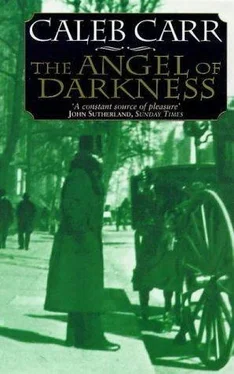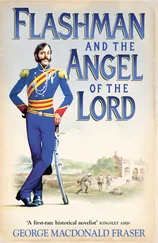Caleb Carr - The Angel Of Darkness
Здесь есть возможность читать онлайн «Caleb Carr - The Angel Of Darkness» весь текст электронной книги совершенно бесплатно (целиком полную версию без сокращений). В некоторых случаях можно слушать аудио, скачать через торрент в формате fb2 и присутствует краткое содержание. Жанр: Детектив, на английском языке. Описание произведения, (предисловие) а так же отзывы посетителей доступны на портале библиотеки ЛибКат.
- Название:The Angel Of Darkness
- Автор:
- Жанр:
- Год:неизвестен
- ISBN:нет данных
- Рейтинг книги:5 / 5. Голосов: 1
-
Избранное:Добавить в избранное
- Отзывы:
-
Ваша оценка:
- 100
- 1
- 2
- 3
- 4
- 5
The Angel Of Darkness: краткое содержание, описание и аннотация
Предлагаем к чтению аннотацию, описание, краткое содержание или предисловие (зависит от того, что написал сам автор книги «The Angel Of Darkness»). Если вы не нашли необходимую информацию о книге — напишите в комментариях, мы постараемся отыскать её.
The Angel Of Darkness — читать онлайн бесплатно полную книгу (весь текст) целиком
Ниже представлен текст книги, разбитый по страницам. Система сохранения места последней прочитанной страницы, позволяет с удобством читать онлайн бесплатно книгу «The Angel Of Darkness», без необходимости каждый раз заново искать на чём Вы остановились. Поставьте закладку, и сможете в любой момент перейти на страницу, на которой закончили чтение.
Интервал:
Закладка:
Once settled into the big old leather chair in Mr. Picton’s office, whiskey in one hand and a cigarette in the other, Marcus began his report.
“The vital statistics were easy enough to lay hands on, or at least most of them were,” he said, taking a drink from the flask, setting it aside, and pulling out a small notebook. “He’s either thirty-nine or forty-I couldn’t get the exact date of birth. Parents: a Unitarian minister who gave up the pulpit to become a furniture maker, and a New England suffragist. He seems to take after the father, for the most part-the old man never lost the crusading spirit. Darrow himself has had a lifelong fascination with Darwin, Spencer, Thomas Huxley-considers himself quite a rationalist. Oh, and he knows about your work, too, Dr. Kreizler.”
“Does he?” the Doctor asked, surprised. “And how did you find that out?”
“I asked him,” Marcus answered simply. “Got in to see him yesterday evening-told him I was a publisher from New York who wanted him to defend an anarchist who’s up for building bombs in New York. The last part of the story’s true, too-you remember Jochen Dietrich, Lucius? That idiot downtown who kept blowing up tenements because he couldn’t get his timing devices to work?”
“Oh, yes,” Lucius said, recalling the name. “The Seventh Precinct boys picked him up just before we left town, didn’t they?”
“That’s right,” Marcus answered, slowly running one of his big hands through his thick black hair and then rubbing his tired brown eyes. “Anyway, one of the Chicago cops I talked to said that Darrow’s got a soft spot for anarchists-fancies himself to be a bit of one, intellectually. So he agreed to see me.” Marcus shook his head and took a big drag off of his cigarette. “He’s a strange sort of character-not at all what you’d expect from a man who’s made a pretty decent living off the corporate payroll. He seems to have a careless attitude toward his appearance-clothes are slightly rumpled, hair’s cut rough and hangs in his face. But there’s something very self-conscious about it all-calculated, even. It’s like he’s trying to play the homespun hero, the plain prairie lawyer. His style of speaking’s the same: he’s got the outward manner of the lonely cynic, but he makes sure you can hear the heart of an idealistic romantic, too. Just how much of it’s genuine, or which parts, I certainly couldn’t tell you.” Marcus flipped a page in his notebook. “There’s some other minor details: he’s a baseball fanatic and an agnostic-”
“Well, of course he’s an agnostic,” Mr. Picton said. “He’s a defense lawyer. There’s only room for one supreme savior in this world, and defense lawyers like to play that role themselves.”
“Now, now, Rupert,” Mr. Moore scolded, “don’t be bitter.”
“He likes Russian literature-poetry and philosophy, too,” Marcus went on. “He has a sort of salon of like-minded souls out there-reads aloud to them at their little gatherings. All in all, a very theatrical and very manipulative character, for all his talk about social justice. Even his own people say so. I talked to a woman who’s a partner in his firm-”
“He’s got a woman in his firm?” Miss Howard said. “An actual partner ?”
“That’s right,” Marcus answered.
“Just to show off to his suffragist friends?” Miss Howard continued. “Or does she actually do something?”
“Actually, that’s the interesting part,” Marcus answered. “He’s not much of an advocate of women’s rights himself-doesn’t really consider them an ‘oppressed’ part of society. Not like, say, labor men or blacks.”
“Well,” the Doctor said, “perhaps we’ll be spared the usual lectures on maternal sanctity, then.”
“Oh, I think we will,” Marcus replied quickly. “But I think what he’ll come at us with instead will be more dangerous-much more dangerous.” Taking a pull off the flask, Marcus hissed and turned to our host. “Mr. Picton, how much of a history were you able to compile on Darrow?”
“I found a piece on the Debs trial,” Mr. Picton answered with a shrug. “It mentioned his background with the railway, but there wasn’t much more than that.”
“Nothing on the Prendergast case?” Marcus asked.
“The Prendergast case?” Mr. Picton said, sitting bolt upright. “Great jumping cats, was he involved in that ?”
“I’m afraid so,” Marcus answered. “Heavily involved.”
“Well, well, well,” Mr. Picton said. “I assume you remember the affair, Doctor.”
The Doctor was already nodding gloomily. “Indeed. A more ludicrous example of perverting justice to please the public has rarely been seen.”
Marcus laughed a bit. “Oddly enough, Doctor, that’s exactly how Darrow saw it.”
Mr. Moore was trying hard to catch up, knocking a fist against his head. “Prendergast, Prendergast…” His face lit up. “Not the fellow who shot the mayor of Chicago?”
“The same,” Marcus answered. “On the last day of the Exposition of 1893-the first assassination in the city’s history. Eugene Patrick Prendergast turned himself in, along with a four-dollar revolver, and claimed that he’d killed Mayor Carter Harrison because his honor hadn’t lived up to a pledge to put Prendergast in charge of building the city’s new elevated track lines. The claim was a fantasy, of course, and the man was obviously a lunatic. But, well, Harrison had been shot at the Exposition, which made for some very bad international press-”
“And so the state of Illinois,” the Doctor continued bitterly, looking at those of us what didn’t already know the story, “decided to entrust the assessment of his sanity to the chief physician of the Cook County Jail-a man with no special training in mental pathologies. Yet even this handpicked flunky had absolutely no trouble declaring that Prendergast was a raging psychotic.”
“Not that it mattered,” Mr. Picton finished. “Prendergast was quickly declared sane by a jury. He was sentenced to hang-and he did hang, didn’t he, Detective?”
“There’s more to the story than that,” Marcus answered. “After the conclusion of the first trial, Darrow-whose personal opposition to the death penalty has always been almost fanatical-offered to help Prendergast’s lawyer try to get a new sanity hearing. This second proceeding began on January twentieth of ’94, and it was very revealing, especially for our purposes.” Flipping further through his notes, Marcus took another pull from the flask. “Darrow took the lead in arguing the defense’s case. And his tactics, according to several people who witnessed them, represented a whole new kind of lawyering. From the start, he shifted the focus off of Prendergast, and onto the jury: he told them that the prosecution was asking them to violate their sacred oath to weigh the case on its merits in order to satisfy society’s desire for revenge. Now, word had gotten around that Darrow was an expert at manipulating juries, so this group was at least somewhat ready for him. But it turned out that he knew they’d been prepared, and instead of crying foul he used that fact to his advantage. In his opening remarks he addressed the rumors that he was going to try to bamboozle them with a lot of technicalities and theatrics. He solemnly pledged that he wouldn’t, because if he tried such trickery and failed, he said, the responsibility-and that’s a key ploy in Darrow’s arguments, responsibility -for Prendergast’s death would rest with him. And he refused, he said, in his plainspoken, humble way, to assume such a moral burden. So he promised that he’d be perfectly straightforward in his arguments-and if the jury decided that his honest attempts weren’t good enough, the responsibility for sending a lunatic to his death would rest with them-not him.”
Читать дальшеИнтервал:
Закладка:
Похожие книги на «The Angel Of Darkness»
Представляем Вашему вниманию похожие книги на «The Angel Of Darkness» списком для выбора. Мы отобрали схожую по названию и смыслу литературу в надежде предоставить читателям больше вариантов отыскать новые, интересные, ещё непрочитанные произведения.
Обсуждение, отзывы о книге «The Angel Of Darkness» и просто собственные мнения читателей. Оставьте ваши комментарии, напишите, что Вы думаете о произведении, его смысле или главных героях. Укажите что конкретно понравилось, а что нет, и почему Вы так считаете.











